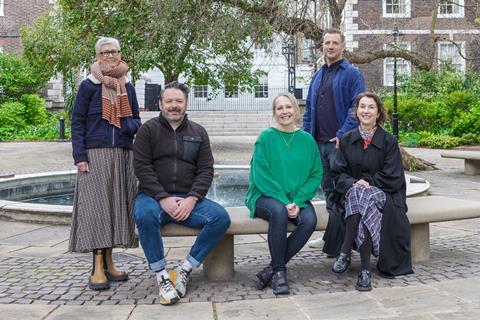Executives from five leading UK sales agencies come together to discuss market energy, building projects and the theatrical outlook.

It has been a gnarly five years for the independent film landscape in the UK, with blue-chip sales agents at the forefront of an industry navigating the hurdles of the pandemic, Hollywood strikes and ensuing market uncertainties.
With Cannes just around the corner and after the historic Independent Film Tax Credit — unveiled in March and offering an enhanced tax relief of around 40% to UK productions budgeted at less than $19m (£15m) — five leading voices in the UK sales scene came together at Screen International’s London headquarters to discuss the state of play in their business.
Cornerstone Films co-president Alison Thompson, Bankside Films managing director Stephen Kelliher, HanWay Films chief executive Gabrielle Stewart, Protagonist Pictures CCO George Hamilton and Independent Entertainment’s managing director of international sales Sarah Lebutsch discussed the lingering impact of the strikes, question marks around the indie tax credit, the thirst for cast and why they are avoiding artificial intelligence.
There was great energy among sales agents heading into February’s European Film Market (EFM), after an underwhelming American Film Market (AFM) that was affected by the Hollywood strikes. Did that energy translate into good business?
Alison Thompson: It was relief that a very tough year was over after the strike, following on from Covid. The fact it has been a very strong year [at the box office] for real, authored cinema excited everybody, and helped us all believe we can kickstart the industry. That mood was very prevalent in Berlin.
Sarah Lebutsch: Berlin was a positive market, with great attendance from buyers. What’s going to be interesting is if this is going to continue, or whether Berlin was so big because AFM was so weak and it was making up for that. It seems like an upward trend: a tepid AFM, good Sundance, good Berlin, so Cannes will be an interesting indicator.
George Hamilton: Some positivity definitely translated, and seems to be continuing. Equally — and I don’t know if anyone else can attest — it’s still down to what you happen to have at the market. Everything is helped by the wider positive headwinds, but your slate is still going to be your slate.
Stephen Kelliher: It was great to see a lot of positivity beforehand, and it feeds into a positive state of mind for the industry. Personally, I don’t know whether it delivered against expectation fully. We had a successful market, we sold and completed many deals, but talking to people, it feels like it didn’t finally deliver in the way people thought it was going to.
What did work, and what has been a struggle in terms of sales?
Gabrielle Stewart: We did some great pre-sales in Berlin on Stephen Frears’ Wilder And Me. It proved that a big talent package with an important director was still very desirable for distributors. We almost sold out on a black-and-white, half-Spanish-language film, La Cocina, in [Berlin’s] Competition, which showed specialty cinema is alive. We set up Bad Apples with a worldwide player. We’re finding success with different projects in different ways.
A very American project, Dreamquil, has now got a US distributor on board and it’s shooting — financed by that US deal. We’ll have a better chance of getting more deals on it. Pre-selling a very American project without a US distributor on board was proving more challenging.
Kelliher: We do a number of worldwide deals and finance films that way, most recently a British comedy [The Ballad Of Wallis Island sold to Focus Features] with Carey Mulligan attached. That goes to show the power of cast. In other circumstances, we probably wouldn’t.
It’s hard to mention disappointments specifically, but lack of a US theatrical deal now has a monumental impact on rest-of-world territories. It diminishes the value in an extraordinary way. There are good films that haven’t attracted that significant theatrical deal, and it’s made the rest of the world very difficult.
Hamilton: We’re doing H Is For Hawk with Claire Foy and Brendan Gleeson, produced by Plan B. We all know the collective reservations people have about drama, but we believed so much in the project, we had to launch it. The strong partners we have found for it in the UK and internationally is testament to that.
We premiered Nora Fingscheidt’s The Outrun at Sundance — that has taken its time but it will be released by a blue-chip US distributor in line with Studiocanal [releasing in the UK, France, and Germany and Austria] this autumn. The power of that talent attachment with that unique vision from a director is reassuring.
Thompson: We have Sting coming out, that pre-sold extremely well, and the filmmaker’s new film [Kiah Roache-Turner’s Beast Of War], which will shoot this summer, has also pre-sold very well. That has enabled us to structure the finance plan with soft money and pre-sales. We have an Elizabeth Banks drama [A Mistake] that has pre-sold to a studio. Andrea Arnold’s Bird is in Cannes, financed by five different financiers. We’ve done a couple of strategic sales on the film, but the intention was always to screen the film finished and then sell it on completion to the majority of territories.
Lebutsch: Layla is one that has been well-received. It is a film that has a particular audience that’s embraced it warmly. Where we’ve had challenges recently is where projects were taken out for pre-sales but didn’t achieve enough, and we’re now trying to figure out how to set up those films.
What now defines a theatrical title?
Kelliher: It’s a very difficult thing to do. The basic elements that we look for are filmmakers with a distinctive voice, who are going to deliver an experience people haven’t seen before or don’t expect. Cast is becoming ever more crucial, more crucial than I’ve ever seen it.
Thompson: If you look at box office, particularly for UK films, those feelgood, middle-of-the-road-centred films have been working. That demonstrates that all kinds of audiences are coming back. It’s not just the specialised cinema audiences who want something to wow them — the general audience, the older female audience, which for many of us has underpinned our business for so long, is coming back, and that’s encouraging.
Why is cast more important now than it ever was?
Stewart: People don’t have the money to spend on P&A [prints and advertising], so they need anything that’s a hook, anything that is marketable to the target audience. Whether it’s a clear concept, or talent that can attract an audience, or IP [intellectual property] — at the end of the day, it just means they don’t have to spend as much.
Kelliher: It’s always been the case, but it seems to be more so than ever. Maybe it’s connected to the collapse of the pay-1 window [first exclusive release window following a film’s theatrical and home entertainment release], distributors want that surety of marketable names their audiences are going to know.
Is there still space for arthouse fare heading into Cannes, or are your slates starrier and more commercial than ever?
Kelliher: We want to have a mix. We have cast-driven titles, but debuts have always been important to us. Talk To Me was a debut and The Quiet Girl was a debut. It’s important we support new talent, otherwise where do our future voices come from? For us, it’s trying to find the balance between the cast-driven films that have a level of certainty — if there is such a thing — in the market, and doing those to be able to support debut directors.
Thompson: In many respects, it feels like we’re at ground zero and reinventing the independent film business. Now is the time to invest in new talent and support it. The scripts that I’ve read in the past 12 months have been fantastic. The quality of screenwriting, out of the UK specifically, in the emerging space is incredibly strong. Part of that is because BBC [Film] and BFI in particular have been investing in this development, somewhat frustratingly for us because they are investing in the smaller films and not supporting the films in the more commercial space. My hope is that translates into something concrete as this new generation of talent comes through.
Stewart: We’ve supported quite a few debuts. We’re about to go into production on Alex Prager’s debut Dreamquil, and we’re in production now on an English-language debut, Bad Apples [by Swedish filmmaker Jonatan Etzler]. It’s a huge part of our business. A lot of the big directors are working with the studios so it has to be part of our business, to foster the new generation of talent. Some of the bigger actors are excited to support emerging voices as well — it’s a good way of getting the talent.

Hamilton: Clarity and specificity of your target audience is important, whether it’s the specialist cinematic audience or the broader audience. Our movie Sasquatch Sunset recently opened in the US and has been doing well. Forget about foreign-language — they speak Sasquatchian. It’s a unique vision but there is cast in it. You may not see the faces of Jesse Eisenberg and Riley Keough but they’re there. Even when something is so unique and original, to have that can be powerful. Just be clear who your audience is — there are no ‘tweeners’.
How much of a headache is it to lock in talent after the strikes?
Stewart: Due to the strike, big talent agencies have been under pressure to get the big paycheques, so we’ve been challenged by that. It has made it harder to access the talent that perhaps had projects with the studios that got delayed into this year.
Lebutsch: On the Simon Amstell film Maria, we lost cast [Felicity Jones and Jonathan Bailey] and need to reconfigure. It’s a common problem we’re all facing, unfortunately.
Hamilton: It’s often about being realistic. We all know the names that will sail a thousand ships and put them on our lists, but the reality is availability or willingness to do certain projects. Being ambitious but realistic is the way to greenlight.
Lebutsch: Have you also found that, depending on the partner you wish to go with, the casting demands can be quite different? The casting list you get from one distributor or streamer will vary from what you get from another.
Kelliher: That’s the thing about casting — whoever you ask, the answer can be quite different.
Hamilton: Building films out of the UK, you have to decide who your anchor partner is and cast appropriately, knowing it will still need to connect to international.
Stewart: The challenge is also, some stars are made through hit streamer series, but then you realise those series weren’t a global hit. You have talent that was very meaningful to the English-speaking world but it doesn’t translate beyond. There are ever greater discrepancies on the meaning of talent from territory to territory.
How are you feeling about the distributor landscape in the UK? Stalwarts such as Pathé and eOne are gone, while some new players are entering the market, such as True Brit Entertainment, and exhibitor Vue is branching out into distribution.
Kelliher: It became quite polarised with the disappearance of a couple of significant companies. There are one or two very big companies, and quite a lot of [smaller] similar-sized companies, and nothing really in the middle. I think the UK is ripe for new entrants.
Thompson: As you can see with True Brit and Vue, someone will come into that space. The challenge is very few of the distributors have an output deal with a streamer or a first pay window, so that makes it difficult for them to pay the kinds of chunky numbers we need to help finance the films. The single biggest thing that could change our lives is if that pay-1 window opens up to local distributors.
Lebutsch: That’s been the market feedback — the pay-1 window has gone away in North America. With the streamers now looking to profitability more than growing subscriber numbers, the expectation is they will pull back from producing so much original content, so the hope is that they come back into the market to license films from us or from the distributors for that window, and that will really help the whole industry.
It’s early days, but do you have any positive impacts to report from the independent tax credit?
Kelliher: It’s what the industry has been campaigning for for a long time; in the current circumstances, it was the single best result. Everybody I speak to is very happy — it will allow more British independent films to go into production. What the interesting facet of that might be is whether an increased tax credit affects what the public funders will do, whether there’s going to be less money available there, or for different types of filmmakers. There’s a lot still to play out but generally it seems to be good news.
Lebutsch: We spoke to one of the major accounting firms and they have said that for a number of films this has now made the difference to get the finance closed and the film into production, so it’s definitely a positive thing. We’ve also heard some productions that were going to shoot in Eastern Europe are now considering a move back to the UK. Whether that means things will get very busy here again, and prices rise because of that, remains to be seen.
Stewart: Apparently, it’s much talked about in LA and everyone is looking at it. It might create congestion in terms of crew and studio space, so let’s see what happens.
How have you evolved your business models? Do you see yourselves as executive producers as much as sales agents now?
Stewart: We’re definitely more involved in production now. We have a development fund, we’re getting involved in projects much earlier. It’s a way of making sure we have strong projects on our slate, and projects we can control globally.
Kelliher: It is difficult to be just a sales agent now. You have to bring more to the table.
Hamilton: We’re in post on our first production, which we’ve developed in-house over many years, The Man In My Basement. We have a slate of production titles that have come to fruition — we build the financing and provide the sales. We can partner to any degree of depth, depending on the project requirements, whether that be producing partner, co-producing partner, facilitating international. All of us have to be partners for the long game — it’s not a short-term activity. It’s never been harder; you need to pool all of those resources, experiences and skills.
Are pre-sales making a comeback?
Thompson: Pre-sales never went away. It depends on the package. If you have the right package, it will pre-sell.
Stewart: There are a lot of financiers who are wanting to roll the dice on the worldwide deal down the line. I’m seeing more projects being set up fully financed and not wanting pre-sales. I think the US talent agencies like helping those financiers find those projects, because they like the idea of doing the worldwide sale. The glamour of the big Sundance sale, the huge number, seems like a nice roll of the dice to play for for some people.
How do you feel about rolling the dice?
Stewart: We’re always arguing we should be on board early and we should be helping with that plan or working on a plan B in the market at the same time. What you don’t want is to take a project to market after it didn’t get its worldwide sale, and then it’s too late. That’s the sort of conversation I have frequently with producers and LA agents to just remind them there is a moment when a film premieres and we should all be working together, have various plans and play the market, and not wait until worldwide didn’t happen.
Lebutsch: That’s absolutely right. A lot of times what you see is that the film premiered in Sundance, then maybe the worldwide deal didn’t happen, and then producers come back only in time for Cannes wanting to sell the film territory by territory. Unfortunately [by then] there’s a whole crop of new films from Berlin and in Cannes.
Are you using AI? And if so, how?
Stewart: The marketing team does… but don’t ask me details.
Lebutsch: We like dealing with real people.
Stewart: Every film is a start-up, it’s a completely different journey. We don’t use AI for that.
Do you predict any more consolidation within the UK sales agent landscape — following on from HanWay, which has sat under the Cohen Media Group umbrella since August 2022, along with UK exhibitor and distributor Curzon?
Thompson: There will continue to be consolidation. I can’t predict where it will be, but I feel positive about the future. We’re reinventing the wheel, it’s a very exciting time, but the next few years are going to continue to be tough, and we’ll have to be creative about how we run our business.
Stewart: It stops you being stagnant. It creates an energy and inward investment — we hired new people, we moved offices, we now share our offices with Curzon. That means a lot more is going on in the building, it creates a whole new energy. Particularly the junior staff love that there are loads more people around.
Kelliher: You have all that expertise in-house, across the whole chain of the industry.
Stewart: It’s nice. But you have a bit of a Chinese wall as well. I got so worried about junior staff in Covid but it feels like they’ve been rewarded.
Are any of you still dabbling in TV?
Hamilton: We dabbled.
Kelliher: We dabbled.
Thompson: We’ve all done a bit of dabbling.
Hamilton: But while we’ve been dabbling, the indie film business has reinvigorated.
Looking ahead, what are you most excited about for the business?
Hamilton: I don’t want to tempt fate but, after Covid and strikes, having a clear pathway to get on and make the movies and get them out there.
Kelliher: I feel we are returning to a theatrical world after a lot of years of [wondering] if we’re going towards streaming, if people are staying at home. We’re about to embark on a new theatrical era. That’s exciting.
Thompson: My sense is that the major players, because they have considerably downsized their production and acquisitions, at some point they’re going to become hungry again, and that’s good for us.
Lebutsch: The last awards season, for foreign-language films to do so well, like The Zone Of Interest and Anatomy Of A Fall collecting all these awards, is a great sign.
Stewart: Cinema is back. It’s exciting to be part of that.

























No comments yet